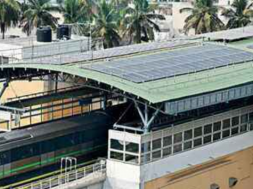
President Donald Trump just decided to slap tariffs on solar equipment imported into America for four years.
There are plenty of losers from the decision: Chinese manufacturers, U.S. rooftop panel installers and renewable energy developers including utilities that are planning large-scale solar farms. There are also a few in the industry that stand to gain — some more surprising than others.
Here’s a look at them:
First Solar
Tempe, Arizona-based First Solar Inc. is the most obvious winner. That’s because it makes some of its panels in the U.S. Also, the kind of thin-film panels it manufactures may be exempt from the tariffs that Trump approved Monday.

Wall Street has been anticipating a boost for First Solar for months. The trade case triggered a mad dash for its panels through 2019, and the company’s stock has rallied almost 140 percent since the dispute that resulted in Trump’s tariffs began.
Gordon Johnson, the U.S. solar industry’s most notorious bear, initiated coverage of First Solar this month with a buy rating and a $95 price target. It closed at $68.96 on Monday.
Tesla’s Gigafactory
Then there’s Tesla Inc. You’d think, as a big-time rooftop solar installer, Tesla would be a big-time loser. But coincidentally, Elon Musk’s Palo Alto, California-based company recently opened one of its so-called gigafactories in Buffalo, New York, with Panasonic Corp. The plant manufactures solar equipment.
In a statement issued Monday, Tesla cited the factory and said it’s committed to expanding its domestic manufacturing “regardless of the solar tariff decision.”

It’s unclear exactly how much of Tesla’s needs the factory will ultimately fulfill, but at the very least, the plant gives the company a leg up over its peers who rely on imports from overseas for the vast majority of supplies. And some of the remaining equipment Tesla imports may prove to be tariff-free since Trump’s allowing an exemption on 2.5 gigawatts of imported solar cells annually.
“The market hasn’t really given value to the solar production,” Ben Kallo, an analyst at Robert W. Baird and Co., said, noting that investors have been focused on Tesla’s Model 3 electric car. “The tariff gives Tesla and Panasonic the runway to ramp up that facility.”
SolarWorld, Suniva
The two solar manufacturers that pushed the Trump administration for tariffs, SolarWorld Americas and Suniva Inc., clearly stand to gain — despite Trump’s decision falling short of expectations.
Suniva had sought duties of 32 cents a watt on imports. Trump’s tariffs translate to a charge of about 10 cents a watt, according to Hugh Bromley, a New York-based analyst at Bloomberg New Energy Finance.
Still, the tariffs stand to boost the value of the companies — and aid their debtors — as they explore potential sales. And they may prove to be a step toward resolving a much larger solar trade dispute with China that dates back to at least 2012. Trump said in his statement that the U.S. Trade Representative will hold discussions that could lead to a “positive resolution” to the solar trade measures that were previously imposed on Chinese solar products and U.S. polysilicon.
Those earlier U.S. duties generated an estimated $1.5 billion that Suniva and SolarWorld could get a cut of should China, the U.S. and the solar industry strike some sort of a deal.
Read this story for more on that separate dispute.
If it’s any testament to whether they gain, Suniva thanked Trump for “holding China and its proxies accountable,” and SolarWorld said it “appreciates the hard work of” Trump and is “hopeful” the tariffs will be enough to rebuild solar manufacturing in the U.S.
And Lastly, Wait for It: Chinese Manufacturers
The prospect of tariffs had already prompted some Asian solar companies to consider building factories in the U.S., including China’s Longi Green Energy Technology Co. To the extent that it follows through with those plans, the company could remain in the game and gain an advantage over its peers abroad.
And if the tariffs really do lead to a resolution over the much larger solar trade dispute between China and the U.S. and ease previously imposed duties, Credit Suisse Group AG sees another “silver lining” for Chinese solar manufacturers:
“Such a resolution could bring Chinese solar products to par pricing with imports from other countries,” the bank’s analysts, including Michael Weinstein, said in a report late Monday.














